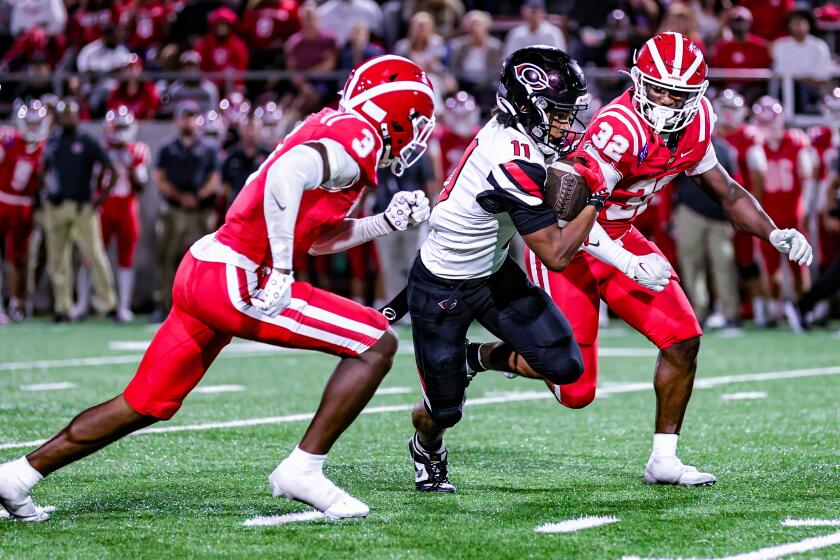WORLD SPORTS SCENE : British Trying to Clean Up Their Act, and Soccer Stadiums, Too
If George Orwell’s novel, “1984,” had been about English soccer, it probably would have included a paragraph such as this:
Lord Justice Peter Taylor, in a 109-page report on fan violence commissioned by the British government, recommended that police and soccer authorities “experiment with electronic tagging of violent fans. Under the plan, hooligans would be barred from matches and police could keep track of their whereabouts with electronic tracers attached to their legs.”
That, however, is not fiction. An excerpt from an Associated Press report, it is an example of the extremes to which the English are prepared to go to cure what Taylor termed a “blight” of violence.
Extreme measures for extreme circumstances. Taylor’s report was commissioned in the wake of last April’s Hillsborough Stadium tragedy in Sheffield, England, where 95 fans were killed.
That particular disaster has been blamed in part on overcrowding, a common occurrence at outmoded English soccer stadiums that pack thousands of fans into standing-room-only terrace sections.
Most important among Taylor’s 76 recommendations, English first and second division soccer teams would be required to eliminate the terraces and provide seats for all fans by 1994. All other teams, including some in rugby and cricket leagues, would have a 1999 deadline.
Government officials said they will comply with the report, which was submitted this week. Home Secretary David Waddington went even further in comments to the House of Commons, calling on clubs to modernize their stadiums. “Squalid conditions encourage squalid behavior,” he said.
The only resistance to the recommendations so far has come from the clubs. They estimate that the proposed renovations would cost a quarter of a billion dollars.
They will receive little sympathy from Taylor, who criticized the clubs for jeopardizing the fans’ safety by allowing the “decay and dilapidation” of stadiums.
Also blaming hooliganism and excessive drinking, he recommended new laws making it a criminal offense for fans to run onto the field, throw objects from the stands or shout obscene or racist chants.
Performance-enhancing drugs regained their position on the front page of sports sections throughout much of the world this week when three athletes tested positive at the Commonwealth Games in Auckland, New Zealand.
It hardly comes as a surprise that the athletes were weightlifters, one from India and two from Wales. Although sprinter Ben Johnson received most of the notoriety for his tainted urine sample in Seoul, the majority of athletes who tested positive at the 1988 Olympic Games were weightlifters.
Richard Pound of Canada, vice president of the International Olympic Committee, subsequently campaigned for an indefinite suspension of the sport from the Olympics. He received little support from other international sports leaders then and said this week that he does not expect increased support now.
Weightlifting officials insist they have become more vigilant. Still, Richard Edmund, director of medical services for New Zealand’s team at the Commonwealth Games, estimated that 80% of the world-class weightlifters use drugs. His estimates in track and field included 70% for field-event performers and 30% for sprinters.
Add drugs: Dr. Howel Jones, medical adviser to the Commonwealth Games Federation, said many athletes have turned to the kidney hormone EPO, which stimulates the production of red blood cells and is believed to increase endurance and power. It cannot yet be detected.
Last add drugs: Josef Odlozil, Czechoslovakia’s silver medalist in the 1964 Olympic 1,500 meters, said 80% of the Czech track and field team in the 1983 World Championships at Helsinki was using drugs. He said it was supervised by team coaches, doctors and officials.
Since Roger Kingdom’s emergence as the world’s best high hurdler, the event can hardly be considered artistic any more. To compete, Greg Foster, who met Kingdom for the first time this year at the Millrose Games Friday night in New York, has gained considerable upper-body strength through lifting weights.
“People tell me that Roger looks terrible going over the hurdles,” Foster said. “I’d be happy to look terrible going over the hurdles in 12-something.”
Foster broke his left arm in each of the last two years, but he said he is not considering retirement.
“I’ll know it’s time to retire when I can no longer dunk a basketball backward,” he said.
Also in the Millrose field was Renaldo Nehemiah, whose world record in the 110-meter high hurdles of 12.93, set in 1981, stood until Kingdom ran 12.92 last summer.
Juventus of Turin, in fifth place in the Italian League of soccer, may save face in the Italian Cup. It beat AS Roma, 2-0, at Turin in the first leg of their home-and-home semifinal round. The other finalist may be Diego Maradona’s division-leading Napoli, which played second-place AC Milan to a scoreless tie at Milan. Napoli and AC Milan, the world champion club team last season, will meet on Feb. 11 in league play and then play again in the Cup at Naples three days later.
The United States, preparing for its first World Cup since 1950, has added East Germany to its exhibition schedule. After playing Hungary in Budapest on March 20, the team will travel to East Berlin for a game March 28. Also on the schedule is a game Feb. 24 at Stanford against the Soviet Union. More than 32,000 tickets have been sold.
International Notes
Dave Gavitt, president of USA Basketball, told the Dallas Morning News that he believes the coach of the 1992 Olympic team will come from the NBA. The Golden State Warriors’ Don Nelson is the leading candidate, but San Antonio’s Larry Brown and the Lakers’ Pat Riley have also been mentioned. The selection may be made in May. . . . East Germany has dominated the world in speed skating, but national coach Rainer Mund said that will change within five years after massive government support and funding for the sport are withdrawn. Mund said that he might emigrate.
On-and-off talks between North and South Korea about fielding a joint team in this year’s Asian Games at Beijing are off again. . . . The United States will send a boxing team to Seoul next week for dual bouts against the South Koreans. It will be the first time U.S. boxers have been there since their controversial performance in the 1988 Olympics. Their coaches reportedly are already studying bus schedules.
Toronto’s City Council voted, 12-5, to continue with its bid for the 1996 Summer Olympics. The opposition came from a group known as “Bread, Not Circuses.” . . . In support of the joint East-West Berlin bid for the Olympics in 2000 or 2004, the West German cities of Hamburg, Frankfurt and Stuttgart, plus the Ruhr region, have halted their campaigns.
The ashes of Canadian swimmer Victor Davis, killed when a car hit him last November in Montreal, were spread into the sea by his former teammates at the Commonwealth Games. . . . The French Press Agency reports that Australian swimmers, to celebrate the end of the Commonwealth Games, “booked a dice with danger by going bungee jumping.”
More to Read
Go beyond the scoreboard
Get the latest on L.A.'s teams in the daily Sports Report newsletter.
You may occasionally receive promotional content from the Los Angeles Times.










